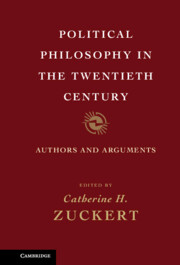Book contents
- Frontmatter
- Contents
- Contributors
- Introduction: political philosophy in the twentieth century
- Part I The three basic alternatives in the early twentieth century
- Part II ??migr?? responses to World War II
- 4 Philosophy as a way of life: the case of Leo Strauss
- 5 The philosopher's vocation: the Voegelinian paradigm
- 6 Yves R. Simon: a philosopher's quest for science and prudence
- 7 Hannah Arendt: from philosophy to politics
- Part III The revival of liberal political philosophy
- Part IV Critiques of liberalism
- Index
- References
7 - Hannah Arendt: from philosophy to politics
Published online by Cambridge University Press: 05 June 2012
- Frontmatter
- Contents
- Contributors
- Introduction: political philosophy in the twentieth century
- Part I The three basic alternatives in the early twentieth century
- Part II ??migr?? responses to World War II
- 4 Philosophy as a way of life: the case of Leo Strauss
- 5 The philosopher's vocation: the Voegelinian paradigm
- 6 Yves R. Simon: a philosopher's quest for science and prudence
- 7 Hannah Arendt: from philosophy to politics
- Part III The revival of liberal political philosophy
- Part IV Critiques of liberalism
- Index
- References
Summary
In the 1970s and 1980s, students of political theory invariably encountered the cliché that political theory and philosophy died sometime in the 1950s, only to be revived in 1971 by the publication of John Rawls's A Theory of Justice. One can be a great admirer of Rawls's work, as I am, and still be taken aback by the radical foreshortening of the history of political thought implied by this cliché. After all, the 1950s and early 1960s saw the publication of some of the most interesting – and enduring – works of political theory of the past sixty years or so.
A few landmarks will have to represent what was, in retrospect, a remarkably fertile period for political thought: Leo Strauss's Natural Right and History (1953), Eric Voegelin's Order and History (1956–7), Isaiah Berlin's Four Essays on Liberty (1969), Sheldon Wolin's Politics and Vision (1960), Jürgen Habermas's Structural Transformation of the Public Sphere (1963) and Theory and Practice (1966), C. B. Macpherson's The Political Theory of Possessive Individualism (1962), and Michael Oakeshott's Rationalism and Politics (1962). To this list must be added Hannah Arendt's major theoretical works: The Origins of Totalitarianism (1951), The Human Condition (1958), On Revolution (1963), and Between Past and Future (1968).
- Type
- Chapter
- Information
- Political Philosophy in the Twentieth CenturyAuthors and Arguments, pp. 108 - 126Publisher: Cambridge University PressPrint publication year: 2011



